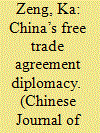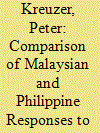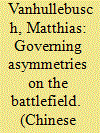|
|
|
Sort Order |
|
|
|
Items / Page
|
|
|
|
|
|
|
| Srl | Item |
| 1 |
ID:
147536


|
|
|
|
|
| Summary/Abstract |
Although Beijing maintains its diplomatic stance of ‘non-interference’ in the internal affairs of other countries, a debate has appeared in recent years on the sustainability of this principle. The various arguments fall into three general groups: abandoning the principle; strict adherence to the principle; and more flexibility in practice while maintaining the principle. Among them, the third, represented by new concepts like ‘creative involvement’ and ‘constructive involvement’, has attracted growing support in academic circles. After a close reading of certain representative arguments, this article suggests that the controversies among different analysts derive largely from divergent judgments on two interrelated, strategic issues: whether China should continue to keep a low profile in global affairs, and China’s relations as a whole with the Western-led international society. The non-interference debate thus reflects the conflicting orientations that underlie the worldview of contemporary China, and the non-interference dilemma Beijing faces. The impact of the debate on Beijing’s policy is difficult to ascertain, but it is noticeable that in spite of its unquestioning commitment to sovereignty and non-interference, which will not change in the short run, the Chinese government is nevertheless moderately adjusting its policies. A loose pragmatic consensus among scholars both reflects and brings about this change.
|
|
|
|
|
|
|
|
|
|
|
|
|
|
|
|
| 2 |
ID:
147534


|
|
|
|
|
| Summary/Abstract |
This article assesses the relative importance of political and economic factors in shaping China’s free trade agreement (FTA) strategy since the country’s accession to the World Trade Organization (WTO) in 2001. Event history analysis of the time lapse before China signed an FTA with a given partner country lends substantial support to arguments emphasizing the political motivations behind China’s choice of FTA partner. The Chinese leadership has undoubtedly signed more FTAs with countries that have similar state preferences. However, there is far less overwhelming evidence to suggest that China’s FTAs are motivated by economic considerations. While Beijing has indeed signed more FTAs with countries on which it depends heavily for imports, there is scant evidence to show that China’s FTAs are designed to enhance market access abroad, or to secure essential supplies of raw materials. Finally, the study analyses the importance of multilateral and regional trade liberalization in shaping China’s FTA policy choices, and finds that, as a major trading nation, China may not be significantly influenced by the competitive dynamics of regional trade liberalization when formulating its FTA strategy.
|
|
|
|
|
|
|
|
|
|
|
|
|
|
|
|
| 3 |
ID:
147533


|
|
|
|
|
| Summary/Abstract |
The conflicts in the South China Sea have caught much attention in the past few years. The vast majority of academic studies focus almost exclusively on the Sino-Vietnamese and the Sino-Philippine conflicts in the South China Sea and the Sino-Japanese conflict in the East China Sea. By not considering the structurally fairly similar conflict between China and Malaysia and generally focusing on the past decade only those analyses neglect variation in Chinese conflict behaviour over time and between opponents. This article compares the high-profile Sino-Philippine conflict to the rather smooth relations between China and Malaysia. Whereas China has regularly challenged Philippine claims and activities in disputed regions, it has exhibited much more restraint towards Malaysia, even though the two countries’ claims overlap and Malaysia, unlike the Philippines, has been extracting substantial resources (LNG) from regions disputed with China since the 1980s. I argue that much of the observable between-country and over-time variation in Chinese conflict behaviour is rooted in the approaches chosen by China’s opponents for framing their overall bilateral relationships with China. Specifically, it is argued that China’s opponents in territorial and maritime conflicts can assuage Chinese behaviour on the ground by signalling recognition and respect of China’s overall self-role and world-order conceptions. Conversely, if they challenge the overarching Chinese self-role and world-order conceptions, China tends towards a coercive strategy. China will also tolerate higher levels of assertiveness of its opponent in the contest for sovereignty, when the opponent displays respect for China’s recognition needs.
|
|
|
|
|
|
|
|
|
|
|
|
|
|
|
|
| 4 |
ID:
147535


|
|
|
|
|
| Summary/Abstract |
Governing contemporary warfare is deeply rooted in the shift since the end of the Cold War towards humanitarianism, whose practice has been accompanied by the parallel evolution of international laws that regulate the use of force (jus ad bellum), the conduct of hostilities (jus in bello), and post-conflict justice (jus post bellum). Yet, new unequal obligations on behalf of the territorial state faced with proxy warfare internally and foreign intervention externally have challenged the core role of such governance, and led to further erosion of the normativity of those rules in the theatres of conflict. As a result, this rule-based approach to government falls short of restoring the actual relationships and human ties between the warring parties. The undesired outcome of such humanitarian ambitions can be mediated through relational governance, as espoused by Yaqing Qin, one of China’s leading international relations scholars, which is founded in a Chinese epistemological and relation-focused framework. Its tools and methods stress the importance of trust and harmonization of relationships, in order for the international laws governing warfare to regain their normativity based on such relationality; without a fertile soil, evolving norms may not gain root and compliance with those norms cannot be fostered in the first place.
|
|
|
|
|
|
|
|
|
|
|
|
|
|
|
|
|
|
|
|
|